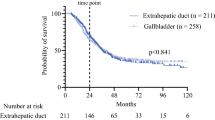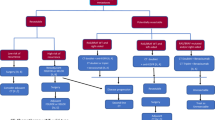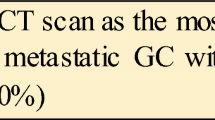Abstract
Curative resection of liver metastases from colorectal cancer is associated with high 5-year overall survival rates, making complete resection the goal of therapy for many patients. Improved outcomes in recent years have resulted in the application of increasingly aggressive multidisciplinary approaches for patients with metastatic disease. The addition of newer, more active chemotherapeutic regimens has prolonged patient survival in those with advanced disease and increased the number of patients eligible for surgical therapy. Furthermore, integration of chemotherapy with hepatectomy in patients with initially resectable disease offers the potential for improving survival beyond that seen with resection alone. Recent randomized studies have demonstrated a benefit of both adjuvant and neoadjuvant chemotherapy. However, questions regarding the optimal indications, regimen, and sequence of therapy remain. The use of neoadjuvant chemotherapy has potential advantages over postoperative adjuvant therapy, including improved patient selection, determining response to therapy, and achieving earlier delivery of systemic therapy. The disadvantages sometimes seen with neoadjuvant therapy include chemotherapy-associated hepatotoxicity and inability to identify resectable lesions. Ultimately, a therapeutic strategy that includes all aspects of multidisciplinary and multimodality care is required to select and treat this complex group of patients.
Similar content being viewed by others
References and Recommended Reading
Ohlsson B, Pålsson B: Follow-up after colorectal cancer surgery. Acta Oncol 2003, 42:816–826.
Weiss L, Grundmann E, Torhorst J, et al.: Haematogenous metastatic patterns in colonic carcinoma: an analysis of 1541 necropsies. J Pathol 1986, 150:195–203.
Scheele J, Stang R, Altendorf-Hofmann A, Paul M: Resection of colorectal liver metastases. World J Surg 1995, 19:59–71.
Altendorf-Hofmann A, Scheele J: A critical review of the major indicators of prognosis after resection of hepatic metastases from colorectal carcinoma. Surg Oncol Clin N Am 2003, 12:165–192.
Scheele J, Stangl R, Altendorf-Hofmann A, Gall FP: Indicators of prognosis after hepatic resection for colorectal secondaries. Surgery 1991, 110:13–29.
Fong Y, Fortner J, Sun RL, et al.: Clinical score for predicting recurrence after hepatic resection for metastatic colorectal cancer: analysis of 1001 consecutive cases. Ann Surg 1999, 230:309–318.
Abdalla EK, Vauthey JN, Ellis LM, et al.: Recurrence and outcomes following hepatic resection, radiofrequency ablation, and combined resection/ablation for colorectal liver metastases. Ann Surg 2004, 239:818–825.
Choti MA, Sitzmann JV, Tiburi MF, et al.: Trends in long-term survival following liver resection for hepatic colorectal metastases. Ann Surg 2002, 235:759–766.
Pawlik TM, Schulick RD, Choti MA: Expanding criteria for resectability of colorectal liver metastases. Oncologist 2008, 13:51–64.
de Gramont A, Figer A, Seymour M, et al.: Leucovorin and fluorouracil with or without oxaliplatin as first-line treatment in advanced colorectal cancer. J Clin Oncol 2000, 18:2938–2947.
Rothenberg ML, Oza AM, Bigelow RH, et al.: Superiority of oxaliplatin and fluorouracil-leucovorin compared with either therapy alone in patients with progressive colorectal cancer after irinotecan and fluorouracil-leucovorin: interim results of a phase III trial. J Clin Oncol 2003, 21:2059–2069.
Hurwitz H, Fehrenbacher L, Novotny W, et al.: Bevacizumab plus irinotecan, fluorouracil, and leucovorin for metastatic colorectal cancer. N Engl J Med 2004, 350:2335–2342.
Saltz LB, Meropol NJ, Loehrer PJ Sr, et al.: Phase II trial of cetuximab in patients with refractory colorectal cancer that expresses the epidermal growth factor receptor. J Clin Oncol 2004, 22:1201–1208.
Adam R, Delvart V, Pascal G, et al.: Rescue surgery for unresectable colorectal liver metastases downstaged by chemotherapy: a model to predict long-term survival. Ann Surg 2004, 240:644–657.
O’Connell MJ, Mailliard JA, Kahn MJ, et al.: Controlled trial of fluorouracil and low-dose leucovorin given for 6 months as postoperative adjuvant therapy for colon cancer. J Clin Oncol 1997, 15:246–250.
Andre T, Boni C, Mounedji-Boudiaf L, et al.; Multicenter International Study of Oxaliplatin/5-Fluorouracil/Leucovorin in the Adjuvant Treatment of Colon Cancer (MOSAIC) Investigators: Oxaliplatin, fluorouracil, and leucovorin as adjuvant treatment for colon cancer. N Engl J Med 2004, 350:2343–2351.
Mitry E, Fields A, Bleiberg H, et al.: Adjuvant chemotherapy after potentially curative resection of metastases from colorectal cancer. A meta-analysis of two randomized trials [abstract 3524]. J Clin Oncol (ASCO Annual Meeting Proceedings) 2006, 24:152s.
Portier G, Elias D, Bouche O, et al.: Multicenter randomized trial of adjuvant fluorouracil and folinic acid compared with surgery alone after resection of colorectal liver metastases: FFCD ACHBTH AURC 9002 trial. J Clin Oncol 2006, 24:4976–4982.
Lorenz M, Muller HH, Schramm H, et al.: Randomized trial of surgery versus surgery followed by adjuvant hepatic arterial infusion with 5-fluorouracil and folinic acid for liver metastases of colorectal cancer. German Cooperative on Liver Metastases. Ann Surg 1998, 228:756–762.
Kemeny N, Huang Y, Cohen AM, et al.: Hepatic arterial infusion of chemotherapy after resection of hepatic metastases from colorectal cancer. N Engl J Med 1999, 341:2039–2048.
Lygidakis NJ, Sgourakis G, Vlachos L, et al.: Metastatic liver disease of colorectal origin: the value of locoregional immunochemotherapy combined with systemic chemotherapy following liver resection. Results of a prospective randomized study. Hepatogastroenterology 2001, 48:1685–1691.
Kemeny MM, Adak S, Gray B, et al.: Combined-modality treatment for resectable metastatic colorectal carcinoma to the liver: surgical resection of hepatic metastases in combination with continuous infusion of chemotherapy—an intergroup study. J Clin Oncol 2002, 20:1499–1505.
Nordlinger B, Sorbye H, Glimelius B, et al.: Perioperative chemotherapy with FOLFOX4 and surgery versus surgery alone for resectable liver metastases from colorectal cancer (EORTC Intergroup trial 40983): a randomised controlled trial. Lancet 2008, 371:1007–1016.
Allen PJ, Kemeny N, Jarnagin W, et al.: Importance of response to neoadjuvant chemotherapy in patients undergoing resection of synchronous colorectal liver metastases. J Gastrointest Surg 2003, 7:109–115.
Adam R, Pascal G, Castaing D, et al.: Tumor progression while on chemotherapy: a contraindication to liver resection for multiple colorectal metastases? Ann Surg 2004, 240:1052–1061.
Weber JC, Navarra G, Jiao LR, et al.: New technique for liver resection using heat coagulative necrosis. Ann Surg 2002, 236:560–563.
Parikh AA, Gentner B, Wu TT, et al.: Perioperative complications in patients undergoing major liver resection with or without neoadjuvant chemotherapy. J Gastrointest Surg 2003, 7:1082–1088.
Tournigand C, Cervantes A, Figer A, et al.: OPTIMOX1: a randomized study of FOLFOX4 or FOLFOX7 with oxaliplatin in a stop-and-go fashion in advanced colorectal cancer—a GERCOR study. J Clin Oncol 2006, 24:394–400.
Petrioli R, Paolelli L, Marsili S, et al.: FOLFOX-4 stop and go and capecitabine maintenance chemotherapy in the treatment of metastatic colorectal cancer. Oncology 2006, 70:345–350.
Rubbia-Brandt L, Audard V, Sartoretti P, et al.: Severe hepatic sinusoidal obstruction associated with oxaliplatin-based chemotherapy in patients with metastatic colorectal cancer. Ann Oncol 2004, 15:460–466.
Pawlik TM, Olino K, Gleisner AL, et al.: Preoperative chemotherapy for colorectal liver metastases: impact on hepatic histology and postoperative outcome. J Gastrointest Surg 2007, 11:860–868.
Vauthey JN, Pawlik TM, Ribero D, et al.: Chemotherapy regimen predicts steatohepatitis and an increase in 90-day mortality after surgery for hepatic colorectal metastases. J Clin Oncol 2006, 24:2065–2072.
Kleiner DE, Brunt EM, Van Natta M, et al.: Design and validation of a histological scoring system for nonalcoholic fatty liver disease. Hepatology 2005, 41:1313–1321.
Fernandez FG, Ritter J, Goodwin JW, et al.: Effect of steatohepatitis associated with irinotecan or oxaliplatin pretreatment on resectability of hepatic colorectal metastases. J Am Coll Surg 2005, 200:845–853.
Sahajpal A, Vollmer CM Jr, Dixon E, et al.: Chemotherapy for colorectal cancer prior to liver resection for colorectal cancer hepatic metastases does not adversely affect perioperative outcomes. J Surg Oncol 2007, 95:22–27.
D’Angelica M, Kornprat P, Gonen M, et al.: Lack of evidence for increased operative morbidity after hepatectomy with perioperative use of bevacizumab: a matched case-control study. Ann Surg Oncol 2007, 14:759–765.
Reddy SK, Morse MA, Hurwitz HI, et al.: Addition of bevacizumab to irinotecan-and oxaliplatin-based preoperative chemotherapy regimens does not increase morbidity after resection of colorectal liver metastases. J Am Coll Surg 2008, 206:96–106.
Ribero D, Wang H, Donadon M, et al.: Bevacizumab improves pathologic response and protects against hepatic injury in patients treated with oxaliplatin-based chemotherapy for colorectal liver metastases. Cancer 2007, 110:2761–2767.
Benoist S, Brouquet A, Penna C, et al.: Complete response of colorectal liver metastases after chemotherapy: Does it mean cure? J Clin Oncol 2006, 24:3939–3945.
Author information
Authors and Affiliations
Corresponding author
Rights and permissions
About this article
Cite this article
Choti, M.A., Pawlik, T.M. Neoadjuvant or adjuvant therapy for patients with resectable liver metastases. Curr colorectal cancer rep 4, 160–166 (2008). https://doi.org/10.1007/s11888-008-0026-x
Published:
Issue Date:
DOI: https://doi.org/10.1007/s11888-008-0026-x




